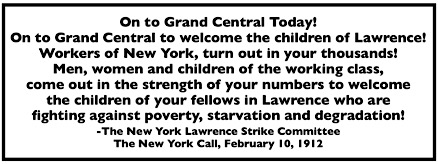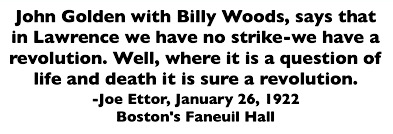 —————
—————
Hellraisers Journal – Wednesday February 14, 1912
Lawrence, Massachusetts – More Children of Strikers to Leave City
From The Boston Daily Glob of February 13, 1912:
—–
—————
 —————
—————
Hellraisers Journal – Wednesday February 14, 1912
Lawrence, Massachusetts – More Children of Strikers to Leave City
From The Boston Daily Glob of February 13, 1912:
—–
—————
 —————
—————
Hellraisers Journal – Monday February 12, 1912
New York, New York – Children of Lawrence Strikers Welcomed by Socialists
From The New York Call of February 10, 1912:
From The New York Times of February 11, 1912:
150 STRIKE WAIFS FIND HOMES HERE
—————
Great Throng Waits in Cold to Give Warm
Welcome to Children from Lawrence, Mass.
———-BANNERS OF RED WAVE
———-
And Crowd Sings the Marseillaise–Children Answer with Strikers’ Cry
–Homes Offered to Many More.
———-The Grand Central Station was the scene of a great demonstration last night when 150 boys and girls, ranging in age from 2 to 12 years, arrive here from Lawrence, Mass. They are the children of the striking textile workers, and they come here to be cared for by working people of New York, who have promised to feed and house them until peace has been restored in Lawrence and the great mills there are again in operation.
More than 700 persons applied for one or more of the children. Among them, it is said, were Mrs. O. H. P. Belmont, Miss Inez Milholland and Rev. Dr. Percy Stickney Grant. The children, however, were all given into the care of the families of laboring men or members of the Socialist Party.
To greet the children a crowd of 5,000 men, women, and children packed the Grand Central Station concourse, singing the “Marseillaise” in many tongues. They waved red flags, some with black borders, and all bearing Socialistic mottoes. It was noticed that not one in that crowd waved aloft the Stars and Stripes.
The men that waved the big red flags said they were not anarchist but Socialist flags, but, whatever they were, they were red everywhere except the lettering and the black borders. The black borders, it was said, were marks of mourning for those of the strikers who have lost their lives in Lawrence. Besides the flags, there were banners, also red, on which were displayed in big type what the crowd called “mottoes.” One painted in gold letters on a long, red streamer, read:
Ye exploiters, kneel down before the of your victims.
Another banner announced that the “libertarians of New York affirm their solidarity to the strikers of Lawrence.” Still another banner bore the same message, except that instead of “libertarians,” it read “the Liberians of New York,” &c. There was also another flaming piece of bunting on which was painted the information that certain Harvard students favored “a free country.”
Long Wait For the Children
The train on which the children were expected to arrive was due at 3:30 P.M., but it was an hour late, and it came in without any of the Lawrence Children. When it did roll in a brass band was playing in the concourse, and the crowd was lined up against ropes that were stretched for the purpose of preventing a too hearty welcome being given to the children.
The crowd did not understand why the children were not on the 3:30 train, and so great did the excitement become that the police had an inquiry made all along the New Haven line to Boston. It was learned that the children missed their train in Boston, and it was announced from the bulletin board that they would arrive on the train that was due at 5:42 P.M., but which would not get in until 6:50 P.M.
It was about 4 o’clock when the unwelcome information was bulletined and the crowd, which had stood for two hours in the bitter cold waiting for the train, dispersed to gather again about 6 o’clock in still greater force. At 6:30 P.M. the Grand Central concourse was packed to capacity, and the reserves of the East Fifty-First Street Station formed lines behind which the crowd was forced to stand until after the children had come out of the station.
At 6:50 the searchlight of the electric engine that pulled the train from Highbridge was sighted coming into the train shed. Then the excitement started in earnest. Slowly the hum of the “Marseillaise” started, gradually gathering in volume. It ended when the train came to a stop and then ensued a series of frantic shouts and yells in a dozen languages. In all the medley there was not heard a single English word except the sharp commands of the police and the station men who were assisting.
Announce Themselves as Strikers
Orders had been issued that the children were not to leave the train until the other passengers had left it and were safely out of the shed. When the children were escorted from the cars they were in charge of fourteen men and women from Lawrence, one of whom was a trained nurse. The children were formed in columns of twos, and at a signal from a young man who was one of those in charge they announced their arrival with a yell.
This is the way the yell goes, and the children shouted it all the way out of the station:
Who we are, who are we, who are we!
Yes we are, yes we are, yes we are.
Strikers, strikers, strikers.
 —————
—————
Hellraisers Journal – Monday January 29, 1912
Boston, Massachusetts – Joe Ettor Speaks on Behalf of Lawrence Strikers
From The Boston Daily Globe of January 27, 1912:
ETTOR SPEAKS IN FANEUIL HALL
———–
Joseph J. Ettor was the star of the great meeting in the interest of the Lawrence strikers which was held last evening in Faneuil Hail under the auspices of the socialist party of Boston. His picturesque looks and his vivid description of conditions in Lawrence contributed in part to the applause which greeted him.
This man differs in appearance from any labor leader that has ever been seen in this part of the world before. He has a face on him which at first impresses you as being feminine, but which becomes masculine and full of expression when he talks. His skin looks as soft as a girls and his eyes are as black as coals.
More than $200 was taken up in a collection for the benefit of the strikers. The hall was crowded, though not uncomfortably so, and the rather large force of policemen found nothing to do but listen. There was a band of music, which kept the crowd entertained until 8:20, when a great cheer went up as the red Socialist flag and the American flag were borne up the center aisle and behind them came Ettor, James P. Carey and a number of people who were to sit on the platform.
The meeting was called to order by George D. Hall, who said he had personally visited all the textile cities in New England and had found nowhere more miserable conditions than existed in Lawrence.
———-
Woman Striker Speaks.
Miss K. S. Hanscom, one of the Lawrence strikers, addressed an audience for the first time and found a little difficulty in expressing herself. But she was so deeply impressed with the thing she wanted to say that she found no difficulty in making herself understood. She wanted to express first her admiration for the courage of the poor people who went out on strike, but more especially for the Italian women who were the first to walk out of the Wood Worsted mill. The average wage of most of the men and women, she said, was $5 a week, and they were compelled to do three and four times more work than formerly. The weavers and spinner do not average $9 a week.
Chairman Hall announced that the Boston Socialist Club proposed through a committee of 300 to collect by means of a house-to-house campaign clothing and funds for the strikers.
———–
Ettor Speaks of Wood.
Joseph J. Ettor was loudly cheered when he was introduced and it took considerable protesting with his hand to stop the applause.
This evening I was an conference with Mr. William M. Wood and he assured me that while I represented 20,000 workers he had 14.000 investors. Some of them live on the Riviera. (Laughter).
[Continued Ettor with a laugh:]
That’s way off in Russia, I guess. You see the capitalist class know no East nor West, nor any other boundary.
The important thing today is that 20,000 mill workers of Lawrence are out on strike. The other side has done all in its power to crush out every effort that has been made by these people in the past to express themselves. The one who made a complaint was always made the victim of oppression by bosses and superintendents.
———-
Learn They Are Not Slaves.
An attempt is being made to bring the workers back to the mills, that they may be able to weave their lives into cloth on the old terms. John Golden with Billy Woods, say that in Lawrence we have no strike-we have a revolution. Well, where it is a question of life and death it is sure a revolution.
Twelve days ago the strikers were slaves, with nobody to speak for them-slaves attached to the looms who did not dare to raise their heads. All that has been changed in 12 days. These people have discovered that they are not slaves to superintendents or agents of mills.
 —————
—————
Hellraisers Journal – Friday January 19, 1912
Lawrence, Massachusetts – Young Striker, Dominico Rapsardo, Bayoneted by Soldier
From The Boston Globe (Morning Edition) of January 16, 1912:
By JOHN W. CARBERRY.
Lawrence, Jan 15-In an attempt to prevent the operation of the woolen mills today, strikers and their sympathizers incited a riot which compelled the City Government to summon police aid from Salem, Lynn, Haverhill, Everett and Lowell, and to call into service eight companies of militia……
Today, in the clash between militiamen and those supporting the cause of the striking textile workers, one youth, Dominico Rapsardo, was stabbed in the breast by a soldier, and is seriously, though not mortally, wounded.
Many others were injured by being struck with the butts of rifles and the clubs of policemen.
More than 30 were arrested charged with damaging property and disturbing the peace…
—–
[…..]
Rapsardo Is Struck Down.
[About 10 a. m., at the Atlantic mills, militiamen with fixed bayonets, charged the strikers and drove them across the bridge at Canal st.]
In the charge Dominico Rapsardo of 51 Essex st was wounded. The crowd was packed so densely that those in front did not fall back quickly enough to suit the soldiers, and young Rapsardo received a thrust from a bayonet in his left breast. he fell fainting to the street, and was hastily driven to the General Hospital, badly injured. The bayonet had penetrated the flesh between the ribs, but doctors believed that no vital organ had been pierced.
[…..]